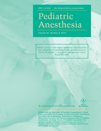Parents’ understanding of and compliance with fasting instruction for pediatric day case surgery
Section Editor: Andrew Davidson
Summary
Objective: To determine whether parents understand and adhere to preoperative fasting instructions.
Aim: To identify how we may reduce perioperative morbidity relating to failure to fast.
Background: Children are routinely fasted preoperatively with the aim of reducing the risk of aspiration of gastric contents and its sequelae.
Methods: Parents of children on the day case ward following elective surgery completed a survey asking: (i) For how long was your child asked to fast? (ii) How long did you ensure your child was fasted of food and clear fluids? (iii) What do you think is the purpose of fasting? We also asked the parents to complete a checklist of items they thought acceptable to consume when fasting.
Results: Despite affirming fasting status in the preoperative check, 13.5% were not fasted. Parents reported advised fasting times of 1–24 h (median 6) for solids and 0.5–24 h (median 3) for fluids. Children were fasted of solids for 3–40 h (median 9.5) and of fluids for 0.5–24 h (median 5). Regarding the understanding of fasting, 9 referred to aspiration and 53 to the prevention of nausea or vomiting. Thirteen believed that fasting status altered the efficacy of anesthesia. During the fasting period, 4.9% would allow French fries, 22.3% toast/crackers, 17.5% cereal, 14.7% a sweet, 14.9% gum, and 12.6% tea with milk.
Conclusions: Children we believe to be fasted may not be. Parents may deliberately misrepresent the actual fasting status of their child. Adherence to fasting advice may be affected by parents’ recall and understanding of fasting advice.




